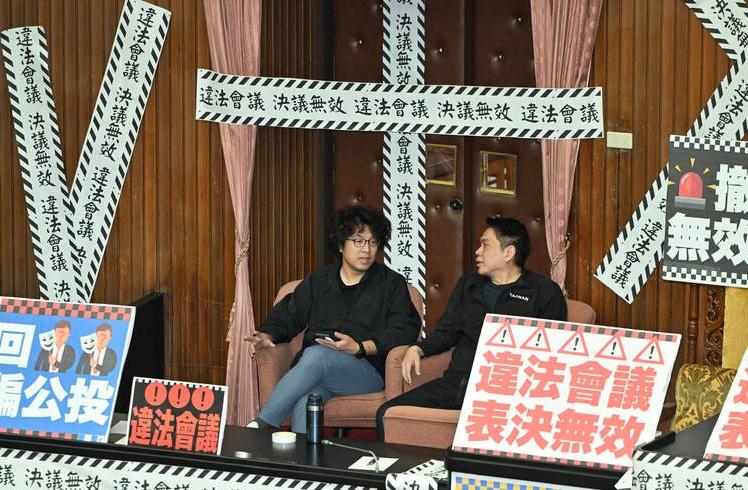Chinese Nationalist Party (KMT) caucus whip Fu Kun-chi (傅崐萁) today urged the Democratic People’s Party (DPP) to abandon its ongoing occupation of the Legislative Yuan, after controversy erupted over two proposed referendums.
DPP caucus chief executive Rosalia Wu (吳思瑤) yesterday accused the KMT and the Taiwan People’s Party (TPP) of conducting a “nighttime raid” on Tuesday by failing to follow proper procedures when passing two referendum bills to a second reading.
On Tuesday, the KMT and TPP met after the usual session times to vote on the motion, with DPP members saying they were not informed.

Photo: Tien Yu-hua, Taipei Times
In the meeting, the opposition parties agreed to propose two referendums, one on opposing the death penalty’s abolition and the other about opposing martial law.
In response to the “raid,” the DPP has organized two consecutive days of sit-ins and submitted an official complaint requesting an investigation by the legislature’s Discipline Committee.
Fu said that the DPP should cease their sit-in as soon as possible, so that lawmakers “can have a good meeting.”
Fu questioned why the DPP, as the ruling party, sought to paralyze the Judicial Yuan, Executive Yuan and Legislative Yuan, asking what the party hopes to achieve by “holding everyone hostage.”
Central Election Commission Chairman Lee Chin-yung (李進勇) today told reporters before appearing at the legislature that the Legislative Yuan has never invoked Article 15 of the Referendum Act (公民投票法) to directly introduce a bill.
Given the lack of precedent and clarity, everyone should review the law calmly and rationally, Lee said.
Article 15 of the act says that if the main text and statement of reasons for a referendum are adopted in a legislative session, the proposal can be referred to the relevant authorities within 10 days.
Asked if the Legislative Yuan acted in a legitimate fashion and if such procedure could become the standard, Lee said that the commission respects the procedures of the Legislative Yuan, but that this issue needs further clarification.

A preclearance service to facilitate entry for people traveling to select airports in Japan would be available from Thursday next week to Feb. 25 at Taiwan Taoyuan International Airport, Taoyuan International Airport Corp (TIAC) said on Tuesday. The service was first made available to Taiwanese travelers throughout the winter vacation of 2024 and during the Lunar New Year holiday. In addition to flights to the Japanese cities of Hakodate, Asahikawa, Akita, Sendai, Niigata, Okayama, Takamatsu, Kumamoto and Kagoshima, the service would be available to travelers to Kobe and Oita. The service can be accessed by passengers of 15 flight routes operated by

Alain Robert, known as the "French Spider-Man," praised Alex Honnold as exceptionally well-prepared after the US climber completed a free solo ascent of Taipei 101 yesterday. Robert said Honnold's ascent of the 508m-tall skyscraper in just more than one-and-a-half hours without using safety ropes or equipment was a remarkable achievement. "This is my life," he said in an interview conducted in French, adding that he liked the feeling of being "on the edge of danger." The 63-year-old Frenchman climbed Taipei 101 using ropes in December 2004, taking about four hours to reach the top. On a one-to-10 scale of difficulty, Robert said Taipei 101

Taiwanese and US defense groups are collaborating to introduce deployable, semi-autonomous manufacturing systems for drones and components in a boost to the nation’s supply chain resilience. Taiwan’s G-Tech Optroelectronics Corp subsidiary GTOC and the US’ Aerkomm Inc on Friday announced an agreement with fellow US-based Firestorm Lab to adopt the latter’s xCell, a technology featuring 3D printers fitted in 6.1m container units. The systems enable aerial platforms and parts to be produced in high volumes from dispersed nodes capable of rapid redeployment, to minimize the risk of enemy strikes and to meet field requirements, they said. Firestorm chief technology officer Ian Muceus said

MORE FALL: An investigation into one of Xi’s key cronies, part of a broader ‘anti-corruption’ drive, indicates that he might have a deep distrust in the military, an expert said China’s latest military purge underscores systemic risks in its shift from collective leadership to sole rule under Chinese President Xi Jinping (習近平), and could disrupt its chain of command and military capabilities, a national security official said yesterday. If decisionmaking within the Chinese Communist Party has become “irrational” under one-man rule, the Taiwan Strait and the regional situation must be approached with extreme caution, given unforeseen risks, they added. The anonymous official made the remarks as China’s Central Military Commission Vice Chairman Zhang Youxia (張又俠) and Joint Staff Department Chief of Staff Liu Zhenli (劉振立) were reportedly being investigated for suspected “serious